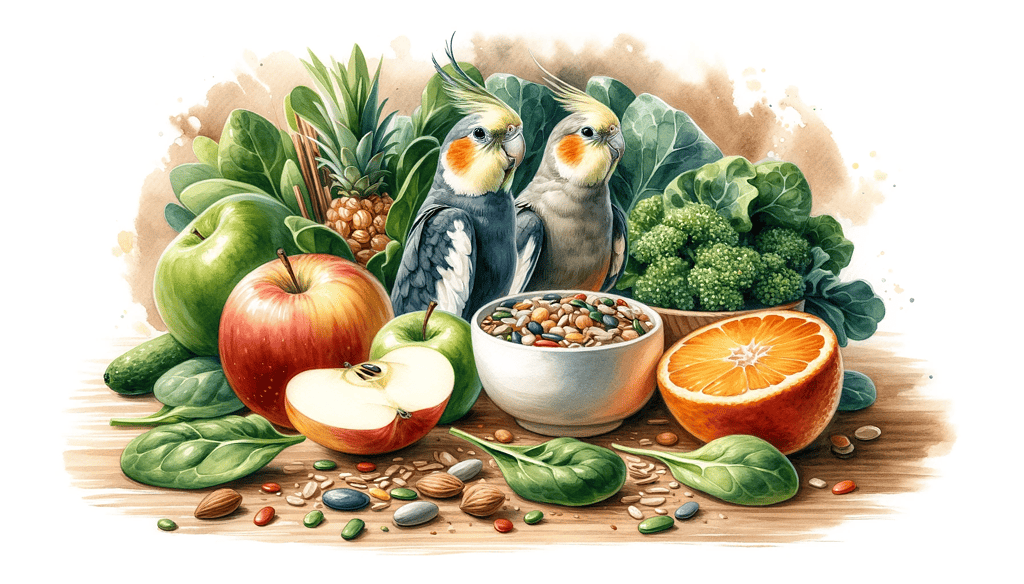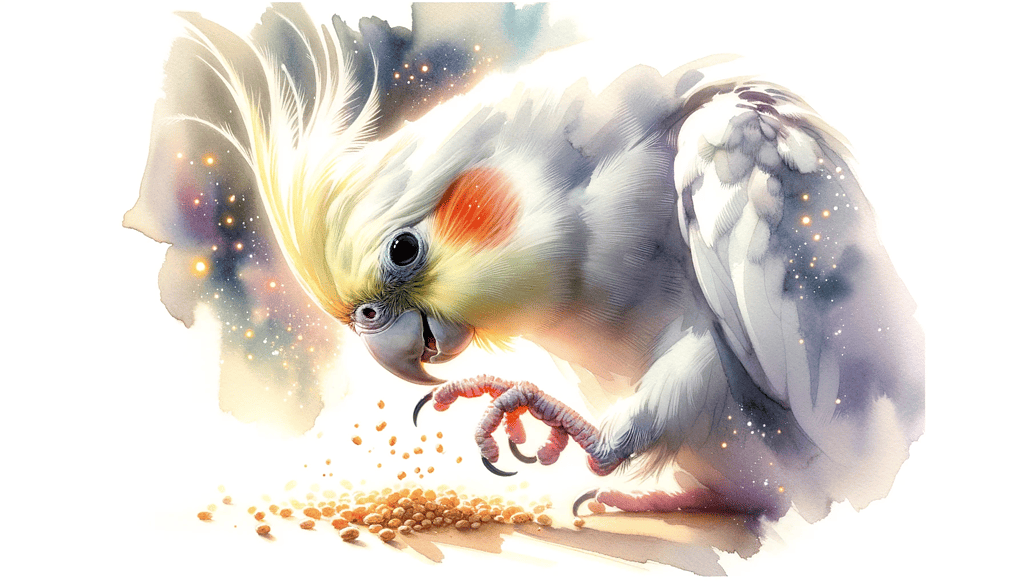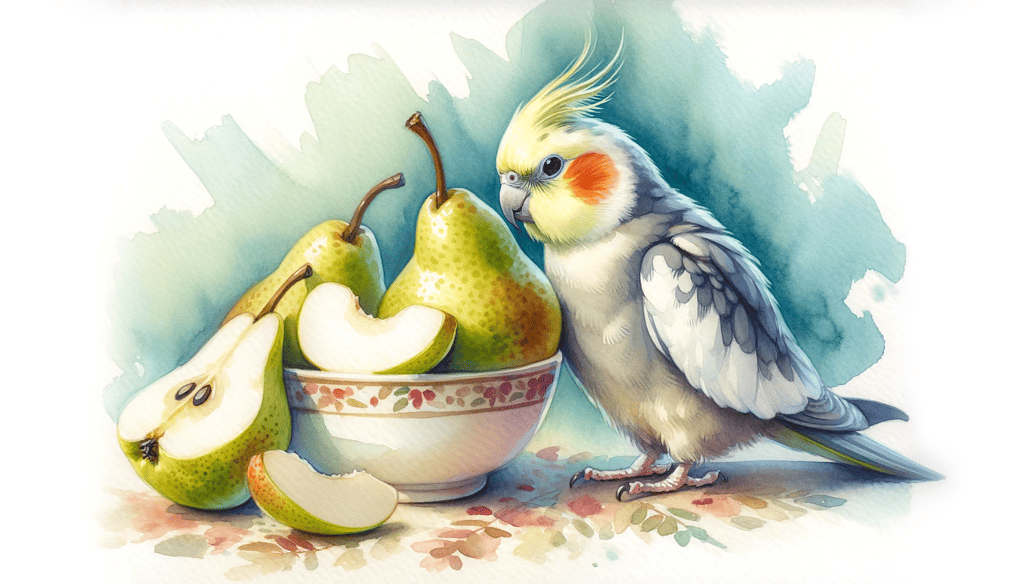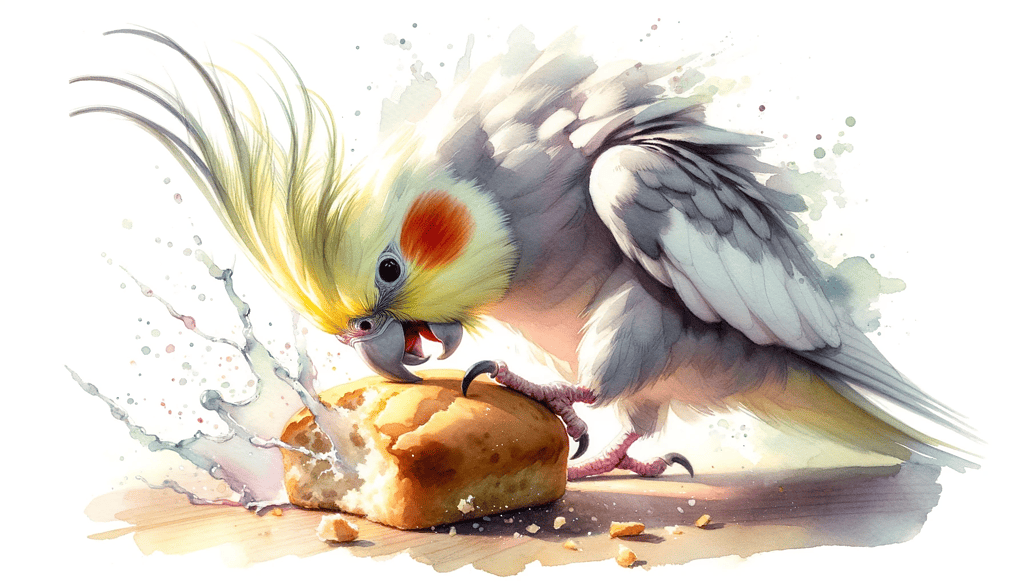
As a bird enthusiast, you know that a happy cockatiel is a healthy one, and treats play a vital role in their well-being. But what treats are best for your feathered friend? Are you wondering how to balance nutrition and indulgence in your cockatiel’s diet?
Generally, the ideal treats for cockatiels blend nutritional value with variety and pleasure. Opt for safe and healthy options like fruits, vegetables, grains, and proteins, ensuring they are served in moderation to keep your cockatiel’s diet well-balanced and diverse.
Dive into this comprehensive guide to discover a range of suitable treats that will not only delight your cockatiel but also contribute to their overall health and happiness. Let’s explore together!
Role of Treats in a Cockatiel’s Diet
Treats play a multifaceted role in a cockatiel’s diet, extending beyond mere indulgence. They are instrumental in providing mental stimulation and environmental enrichment, crucial for a cockatiel’s overall well-being.
When chosen wisely, treats can supplement essential nutrients that might be less abundant in their regular feed, contributing to a more rounded and balanced diet.
Additionally, treats can be a powerful tool for training and bonding, helping to strengthen the connection between you and your feathered friend.
However, it’s vital to ensure these treats are given in moderation to avoid nutritional imbalances and health issues like obesity. In essence, treats are not just snacks; they’re a key component in nurturing a happy, healthy, and well-adjusted cockatiel.
Healthy Treat for Cockatiels
Now, let’s dive into some healthy treat options that will not only delight your cockatiel but also contribute to its well-being.
1. Seed Sticks

Seed sticks are more than just a tasty snack; they offer nutritional benefits too. They can be a source of essential nutrients like protein, vitamins, and minerals, depending on the seeds used. You might be wondering whether to opt for homemade or store-bought seed sticks.
Both have their merits. Homemade seed sticks allow you to control the ingredients, ensuring they’re fresh and healthy. Store-bought options, on the other hand, are convenient and often come with a variety of seeds and grains.
Table: Nutritional Value of Homemade vs. Store-Bought Seed Sticks
| Nutrient | Homemade Seed Sticks | Store-Bought Seed Sticks |
| Protein | High (varies based on seeds used) | Moderate to High |
| Fat | Lower (controlled ingredients) | Higher (may include added fats) |
| Fiber | Higher (natural seeds) | Moderate |
| Vitamins & Minerals | Depends on seed mix | Often enriched with additional nutrients |
| Sugar | Lower (no added sugars) | Higher (may contain added sugars) |
2. Spray Millet
Spray millet is a delightful treat for cockatiels, offering both nutritional benefits and a bit of fun. I’ve seen how millet can be a great source of iron, calcium, magnesium, phosphorus, and vitamins, especially B vitamins.
However, it’s crucial to balance its use in your cockatiel’s diet to avoid overindulgence, which can lead to nutritional imbalances.
How to Incorporate Millet into the Diet
- Start Small: Introduce millet in small amounts, perhaps a few sprigs per week.
- Monitor Your Bird’s Response: Observe how your cockatiel reacts to millet. Some birds may show a strong preference for it, which requires careful management.
- Balance with Other Foods: Ensure that millet is part of a varied diet that includes pellets, fruits, and vegetables.
- Use as a Training Tool: Millet can be an effective reward during training sessions.
- Regular Health Checks: Keep an eye on your cockatiel’s weight and overall health to ensure that the addition of millet isn’t leading to any health issues.
3. Peanut Butter
Peanut butter can be a nutritious treat for cockatiels, rich in protein and loved by many birds. However, moderation is key, and it’s important to choose the right type of peanut butter.
Do’s and Don’ts When Feeding Peanut Butter to Cockatiels
- Do choose natural, unsalted peanut butter without added sugars or preservatives.
- Don’t offer peanut butter in large quantities; a small amount is sufficient.
- Do ensure the peanut butter is smooth and not chunky to prevent choking hazards.
- Don’t use peanut butter as a daily treat; it should be given occasionally.
- Do mix peanut butter with other foods like fruits or vegetables for a varied diet.
4. Mealworms
Mealworms are an excellent source of protein, crucial for your cockatiel’s muscle development and overall health. When introducing mealworms to your feathered friend, it’s essential to do so gradually. Start with a few mealworms mixed into their regular food, gradually increasing the quantity over time. This ensures your cockatiel gets accustomed to the new food without overwhelming them.
5. Fruits

Fruits are a fantastic way to add variety and essential nutrients to your cockatiel’s diet. However, not all fruits are created equal when it comes to bird feeding. Here’s a list of safe fruits for your cockatiel, along with preparation tips:
- Apples: Remove seeds and core; serve in small pieces.
- Bananas: Peel and offer in moderation due to high sugar content.
- Berries: Wash thoroughly; can be given whole or mashed.
- Melons: Remove seeds; cut into small, manageable chunks.
- Pears: Core and cut into bite-sized pieces; remove seeds.
6. Beans
Beans are a fantastic treat option for cockatiels, offering a powerhouse of nutrition in a tiny package. Rich in protein, they support muscle health and feather growth, making them an excellent choice for your bird’s diet.
Additionally, beans are a great source of fiber, aiding in healthy digestion. They also provide essential vitamins and minerals like iron, magnesium, and B vitamins, contributing to overall health and vitality.
When offering beans to your cockatiel, it’s crucial to serve them cooked and unsalted, as raw beans can be harmful. This treat, when given in moderation, can be a delightful and nutritious addition to your cockatiel’s meal plan.
7. Oats and Oat-Based Treats
Oats and oat-based treats are excellent choices for cockatiels, offering both nutrition and variety. Rich in fiber, oats aid in digestion and promote gut health, making them a wholesome addition to your bird’s diet. They are also a good source of essential minerals like iron and magnesium, which contribute to overall health and vitality.
When preparing oat-based treats, it’s best to use plain, unflavored oats and combine them with other safe ingredients like fruits or vegetables for added nutritional value. These treats not only satisfy your cockatiel’s taste buds but also provide a fun, engaging way to eat, as they can peck and play with the textures.
8. Corn
Corn, in its various forms, serves as a delightful treat for cockatiels, offering both taste and nutritional benefits. Different corn varieties, such as sweet corn, baby corn, and even popcorn (unsalted and unbuttered), can be introduced into their diet. These varieties provide essential vitamins and minerals, contributing to the overall health of your feathered friend.
Corn is a powerhouse of nutrients, providing antioxidants, B vitamins, manganese, and zinc. These elements play a crucial role in maintaining your cockatiel’s overall health. Antioxidants help combat oxidative stress, B vitamins are crucial for energy metabolism, manganese aids in bone formation, and zinc supports immune function.
Sweet corn, with its soft, easy-to-eat kernels, is particularly loved by cockatiels for its natural sweetness. Baby corn offers a crunchy texture that can be both fun and beneficial for their beak health. When offering corn, ensure it’s cooked and cooled to room temperature to make it safe and enjoyable for your cockatiel.
Different Ways to Serve Corn
- Corn on the Cob: Offering corn on the cob is more than just a meal; it’s an engaging activity for your cockatiel. They love to pick at the kernels, which provides mental stimulation and helps keep their beak in shape.
- Popcorn: Believe it or not, plain popcorn (without salt, butter, or flavorings) can be a healthy treat. It’s low in fat and provides a fun, crunchy texture that cockatiels adore. Just make sure it’s popped without harmful oils.
- Cooked Corn: Soft, cooked corn kernels can be a delightful treat. They’re easier to eat and digest, especially for younger or older birds.
9. Sprouts
Sprouts are a nutritional goldmine for cockatiels. They are rich in enzymes, making them easier to digest. They also offer a boost in vitamin content compared to unsprouted seeds and grains. Vitamins like A, C, and E, along with minerals such as iron and calcium, are more abundant in sprouts. These nutrients are vital for your cockatiel’s immune system, feather health, and overall vitality.
How to Grow and Serve Sprouts
Growing sprouts at home is simple and ensures that your cockatiel gets the freshest, most nutritious treat possible. Here’s a quick guide:
- Rinse the seeds (like millet, quinoa, brown rice, wheat, rye, or barley) thoroughly.
- Soak them in clean water for about 8 hours.
- Drain and transfer the seeds to a jar covered with cheesecloth.
- Place the jar in a well-lit area, like a windowsill, and rinse the seeds twice daily.
- Once sprouted, offer them to your cockatiel as a fresh, crunchy treat.
10. Cuttlefish Bone
Let’s talk about a crucial component in a cockatiel’s diet – the cuttlefish bone. This isn’t just a treat; it’s a necessity for your bird’s health, especially when it comes to calcium intake. Calcium plays a pivotal role in your cockatiel’s health. It’s essential for strong bones, proper muscle function, and overall vitality.
A deficiency in calcium can lead to serious health issues, including weakened bones and beak, egg binding in females, and even seizures.
How to Offer Cuttlefish Bone
Offering cuttlefish bone to your cockatiel is straightforward. Simply attach it to the side of the cage where your bird can easily access it. They will instinctively peck at it, which not only provides them with necessary calcium but also helps keep their beak trimmed and healthy.
11. Eggs
With a passion for avian health, I can tell you that eggs are a fantastic treat for your cockatiel. Not only are they a source of high-quality protein, but they also provide essential amino acids, vitamins, and minerals. They also provide a good balance of essential nutrients like selenium and riboflavin, which are crucial for your bird’s overall health and feather quality.
Here’s how you can safely prepare eggs for your feathered friend:
- Boiled Eggs: Boil an egg for about 10 minutes. Once cooled, chop it into small pieces suitable for your cockatiel. You can offer these pieces 1-2 times per week. Remember, moderation is key!
- Scrambled Eggs: Scrambled eggs are another great option. Just avoid adding oil, salt, or spices. For an extra health boost, you can mix in some finely chopped vegetables.
12. Whole Grain Bread and Pasta

Whole grain bread and pasta can be excellent treats for cockatiels, offering both taste and nutritional benefits, when chosen correctly and served in moderation.
- Choosing the Right Type: Opt for whole grain or whole wheat varieties. These are richer in nutrients like B vitamins, magnesium, iron, and selenium compared to white bread or pasta.
- Serving Suggestions: Offer small pieces of bread or cooked pasta. The texture of whole grain products can be quite enjoyable for cockatiels. For pasta, you can serve it both cooked and uncooked. Uncooked pasta provides a crunchy texture, while cooked pasta is softer and can be mixed with vegetables for added nutrition.
Incorporating these whole grains occasionally into your cockatiel’s diet can add a delightful variety, keeping mealtime both exciting and healthful.
13. Peppers
Peppers serve as an excellent treat for cockatiels, offering both taste and nutritional benefits. Rich in vitamins A and C, they can boost your bird’s immune system and overall health. Bell peppers, in all their colorful varieties, are particularly popular, being both mild and safe. They provide a crunchy texture that cockatiels enjoy.
Even chili peppers, surprisingly, are safe and often relished by these birds, thanks to their ability to taste the heat without harm. Incorporating a mix of different peppers into your cockatiel’s diet can add a burst of flavor and essential nutrients, making them a delightful and healthy choice.
Safe Types of Peppers for Cockatiels
- Bell Peppers: All colors of bell peppers are safe and nutritious.
- Sweet Peppers: These are a good choice, offering a mild flavor.
- Chili Peppers: Surprisingly, many cockatiels enjoy the heat! They are safe but should be given in moderation.
- Banana Peppers: These are mild and safe for cockatiels.
- Poblano Peppers: Another safe option, but ensure they are not too spicy.
Treating your cockatiel involves a balance of variety and moderation. Incorporating fruits, vegetables, and grains as treats not only adds nutritional value but also enriches their diet with enjoyment. It’s crucial to always verify the safety of any new foods. Our exploration from nutritious peppers to eggs and grains offers a range of healthy options to boost your cockatiel’s well-being.
Frequently Asked Questions
What treats are safe for cockatiels?
Safe treats include fruits like apples and bananas, vegetables like carrots and broccoli, and grains like cooked rice and pasta.
How often should I give my cockatiel treats?
Treats should be given in moderation, making up no more than 10% of your cockatiel’s diet.
Can cockatiels eat human food as treats?
Yes, but it’s important to ensure the food is safe and free from salt, sugar, and spices.
Are there any treats I should avoid giving my cockatiel?
Avoid avocado, chocolate, caffeine, and anything high in fat or sugar.
